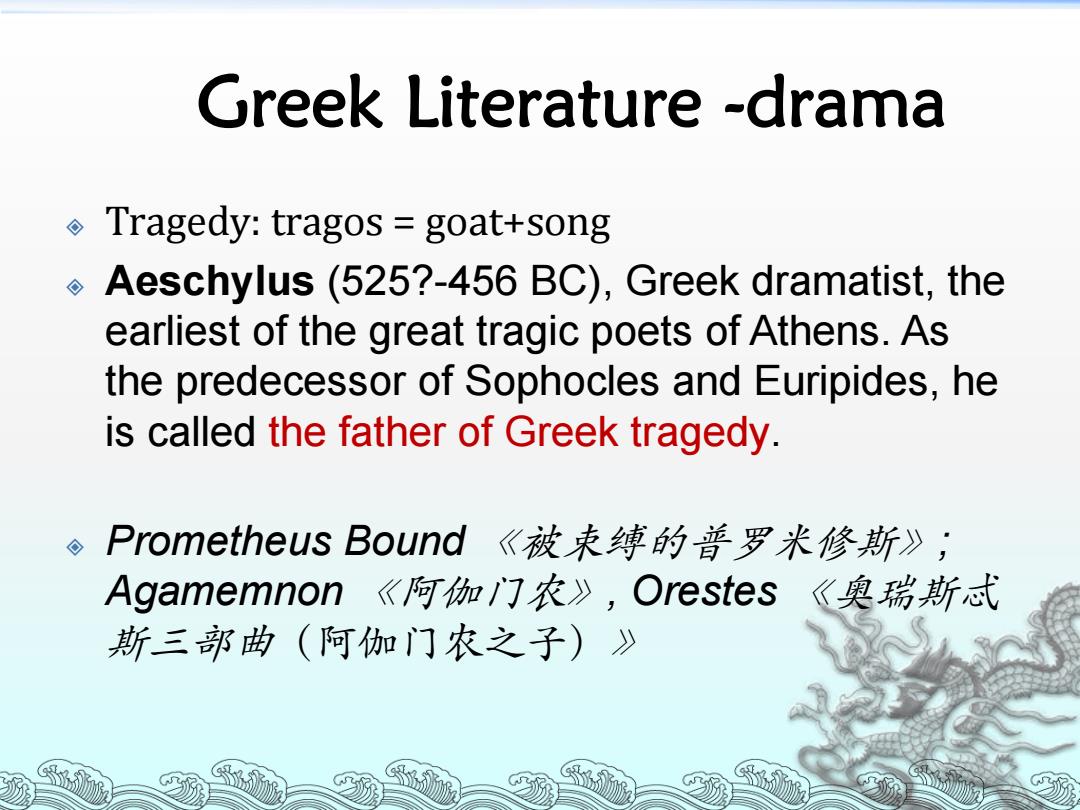
Greek Literature -drama Tragedy:tragos goat+song Aeschylus (525?-456 BC),Greek dramatist,the earliest of the great tragic poets of Athens.As the predecessor of Sophocles and Euripides,he is called the father of Greek tragedy. 。Prometheus Bound《被束缚的普罗米修斯》; Agamemnon《阿伽门农》,Orestes《奥瑞斯s忒 斯三部曲(阿伽加门农之子)》
Greek Literature -drama Tragedy: tragos = goat+song Aeschylus (525?-456 BC), Greek dramatist, the earliest of the great tragic poets of Athens. As the predecessor of Sophocles and Euripides, he is called the father of Greek tragedy. Prometheus Bound 《被束缚的普罗米修斯》; Agamemnon 《阿伽门农》, Orestes 《奥瑞斯忒 斯三部曲(阿伽门农之子)》
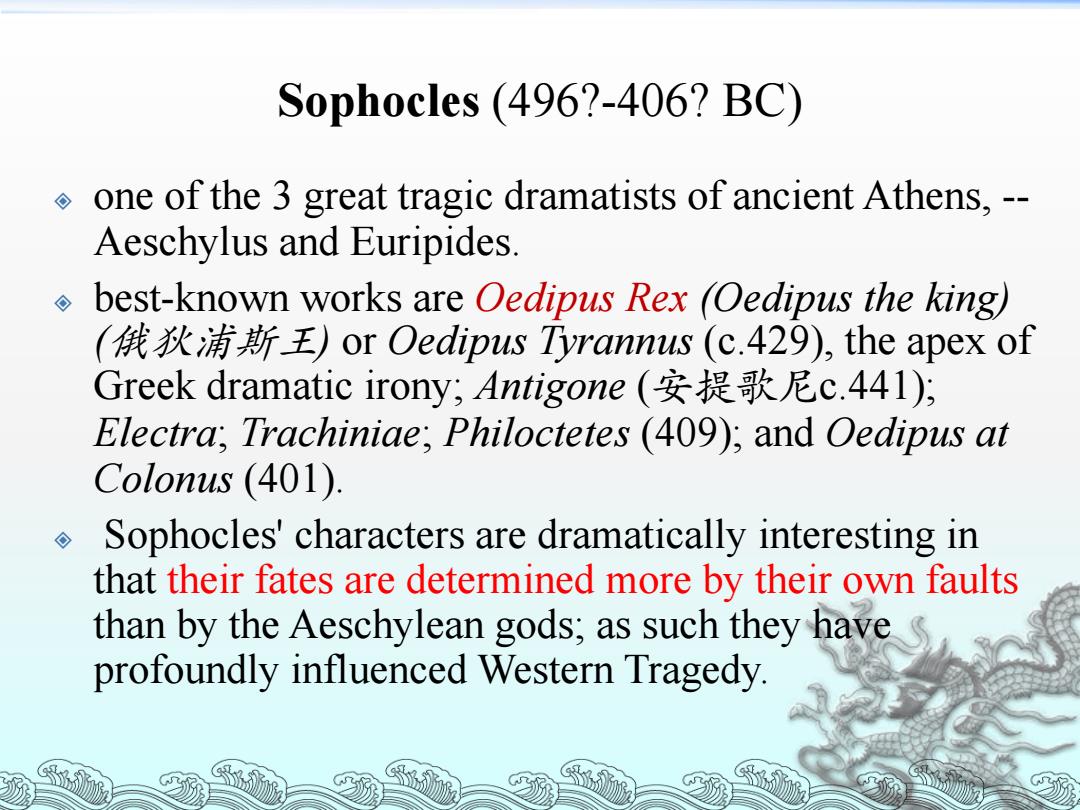
Sophocles (496?-406?BC) one of the 3 great tragic dramatists of ancient Athens,- Aeschylus and Euripides. best-known works are Oedipus Rex (Oedipus the king) (俄狄j斯王)or Oedipus Tyrannus(c.429),the apex of Greek dramatic irony,Antigone(安提歌尼c.441), Electra;Trachiniae;Philoctetes (409);and Oedipus at Colonus (401). Sophocles'characters are dramatically interesting in that their fates are determined more by their own faults than by the Aeschylean gods;as such they haves profoundly influenced Western Tragedy
Sophocles (496?-406? BC) one of the 3 great tragic dramatists of ancient Athens, -- Aeschylus and Euripides. best-known works are Oedipus Rex (Oedipus the king) (俄狄浦斯王) or Oedipus Tyrannus (c.429), the apex of Greek dramatic irony; Antigone (安提歌尼c.441); Electra; Trachiniae; Philoctetes (409); and Oedipus at Colonus (401). Sophocles' characters are dramatically interesting in that their fates are determined more by their own faults than by the Aeschylean gods; as such they have profoundly influenced Western Tragedy
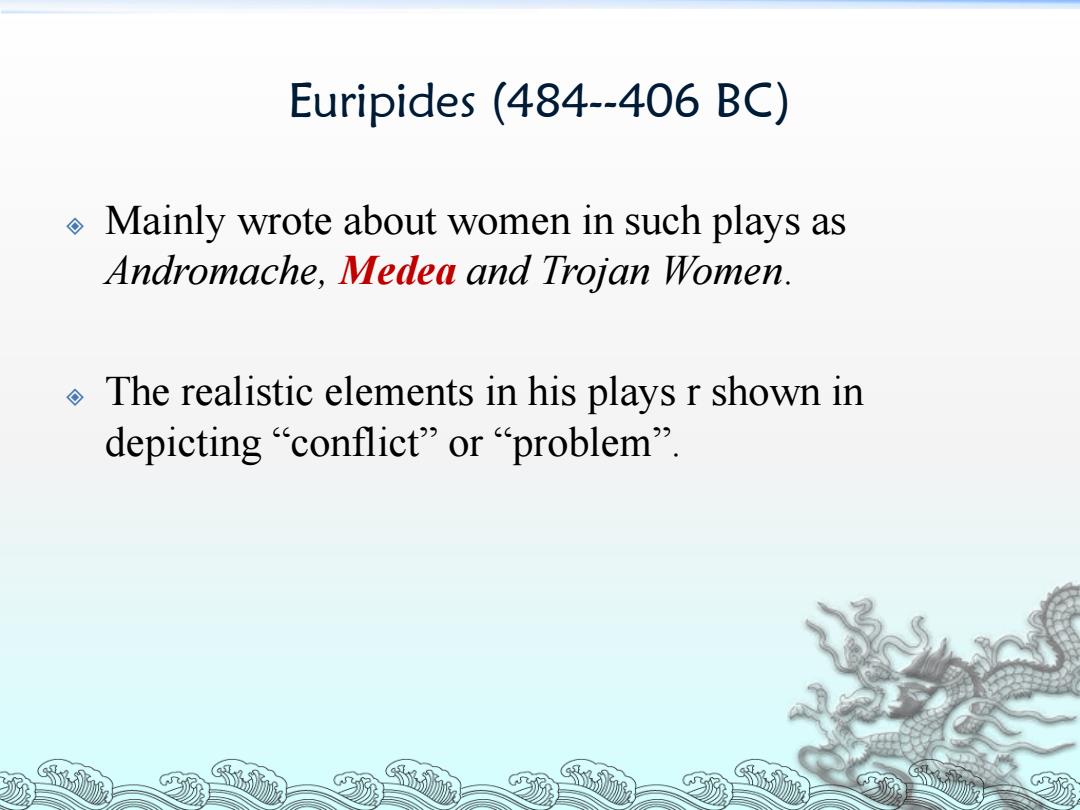
Euripides (484--406 BC) Mainly wrote about women in such plays as Andromache,Medea and Trojan Women. The realistic elements in his plays r shown in depicting“conflict''or“problem
Euripides (484--406 BC) Mainly wrote about women in such plays as Andromache, Medea and Trojan Women. The realistic elements in his plays r shown in depicting “conflict” or “problem

Comedy-Aristophanes(阿里斯托芬,circa448-385BC) Athenian playwright,considered one of the greatest writers of comedy in literary history--Frogs,Clouds, Wasps,and Birds. His plays have been produced through the centuries and,because of their wit,comic invention,and poetic language,have remained popular
Comedy -- Aristophanes (阿里斯托芬, circa 448-385 BC) Athenian playwright, considered one of the greatest writers of comedy in literary history --Frogs, Clouds, Wasps, and Birds. His plays have been produced through the centuries and, because of their wit, comic invention, and poetic language, have remained popular

Phases of Greek philosophy (6th century BC-6th century AD,later than Greek mythology,borrowed a lot from it and early religion) I.Physico-philosophy II.Philosophy of man--sophists III.Systematic philosophy G
Phases of Greek philosophy (6th century BC- 6th century AD, later than Greek mythology, borrowed a lot from it and early religion) I. Physico-philosophy II. Philosophy of man -- sophists III. Systematic philosophy

ILLYRIA Black Sea Epidamnus THRACE Amphipolis Pella Sea of Marard 422当C MACEDONIA THASOS CHALCIDICE Cyzicus 410 ac Potidaea 432-430c 405 EPIRUS LEMNOS CORCYRA COIEYra 427 PINDUS MTS THESSALY Mytlane 428-427s PERSIAN LESBOS EMPIRE Arginusae Islands AETOLIA Aegean ANATOLIA Delphi BOEOTIA EUBOEA Sea● Naupactus ×20eum424ac "Sardis Thebes. CHIOS 429B ACHAEA Platae442四427ac ATTICA fonian Corinth'Megara Athens Ephesus! ARCADIA Sea Mantinea X Argos SAMOS 418ac AEGINA PELOPONNESUS MESSENTA DELOS .Sparta Halicarnassus。 Pylos× LLACONIA 425 Melos416ac*9。 MELOS Athens and allies RHODES Sparta and allies Sea o f C r e t e Neutral Greek states ×Major battles 50 100Km Major sieges of cities CRETE 0
Map: Athens vs Sparta: N-105

塔兰托 阿布德是 拜占庭定顺 加耳西顿 培拉● 埃利亚 西济斯 兰浦沙科 亚历山大时期的地中海东部地区 克罗托 莱斯伯斯 帕加马 ●阿克拉加斯 底比斯 以弗所 科林斯 叙拉古 迈锡尼代梯袄坻 %开俄斯 ●劳迪西亚 萨摩斯 米利都 。斯巴达 希拉0 克尼多斯 帕尔米拉● 克诺索斯 赫利奥波利斯 费斯托斯马利亚 ● 亚历山大 2飞N
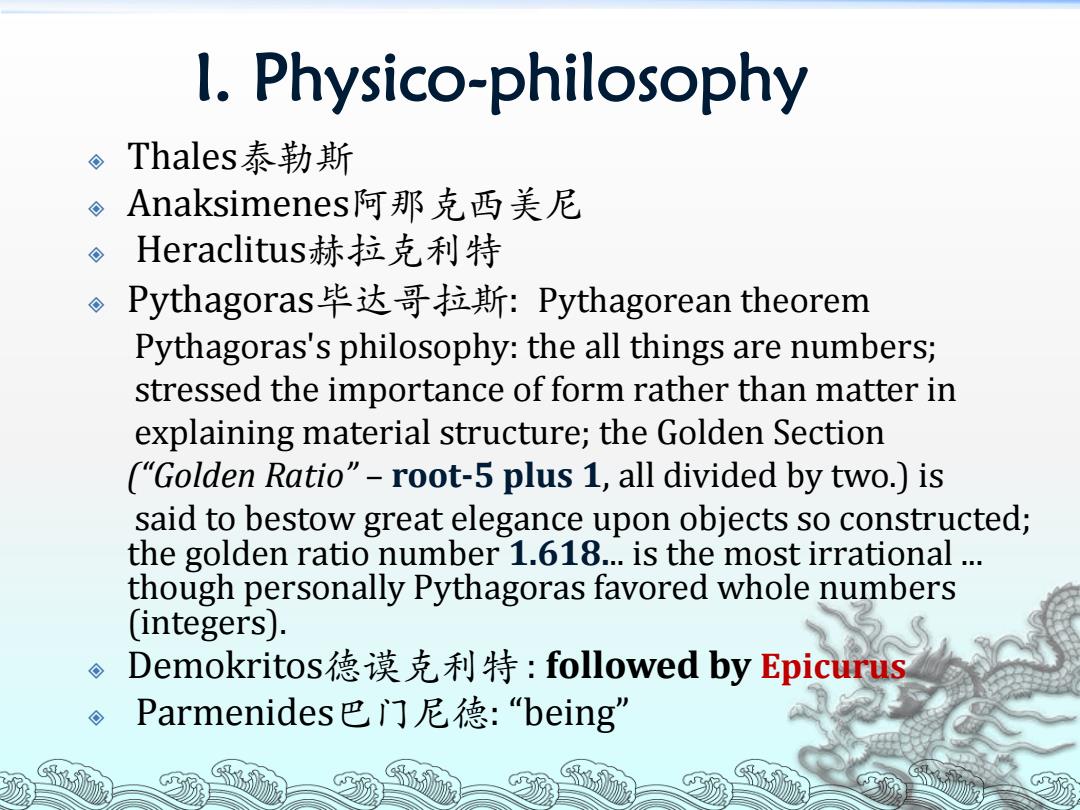
I.Physico-philosophy 。Thales泰勒斯 。Anaksimenes阿那克西美尼 Heraclitus赫拉克利特 Pythagoras.毕达哥拉斯:Pythagorean theorem Pythagoras's philosophy:the all things are numbers; stressed the importance of form rather than matter in explaining material structure;the Golden Section ("Golden Ratio"-root-5 plus 1,all divided by two.)is said to bestow great elegance upon objects so constructed; the golden ratio number 1.618...is the most irrational... though personally Pythagoras favored whole numbers (integers). Demokritos德谟克利特:followed by Epicurus Parmenides巴门尼德:“being A
I. Physico-philosophy Thales泰勒斯 Anaksimenes阿那克西美尼 Heraclitus赫拉克利特 Pythagoras毕达哥拉斯: Pythagorean theorem Pythagoras's philosophy: the all things are numbers; stressed the importance of form rather than matter in explaining material structure; the Golden Section (“Golden Ratio” – root-5 plus 1, all divided by two.) is said to bestow great elegance upon objects so constructed; the golden ratio number 1.618... is the most irrational ... though personally Pythagoras favored whole numbers (integers). Demokritos德谟克利特 : followed by Epicurus Parmenides巴门尼德: “being
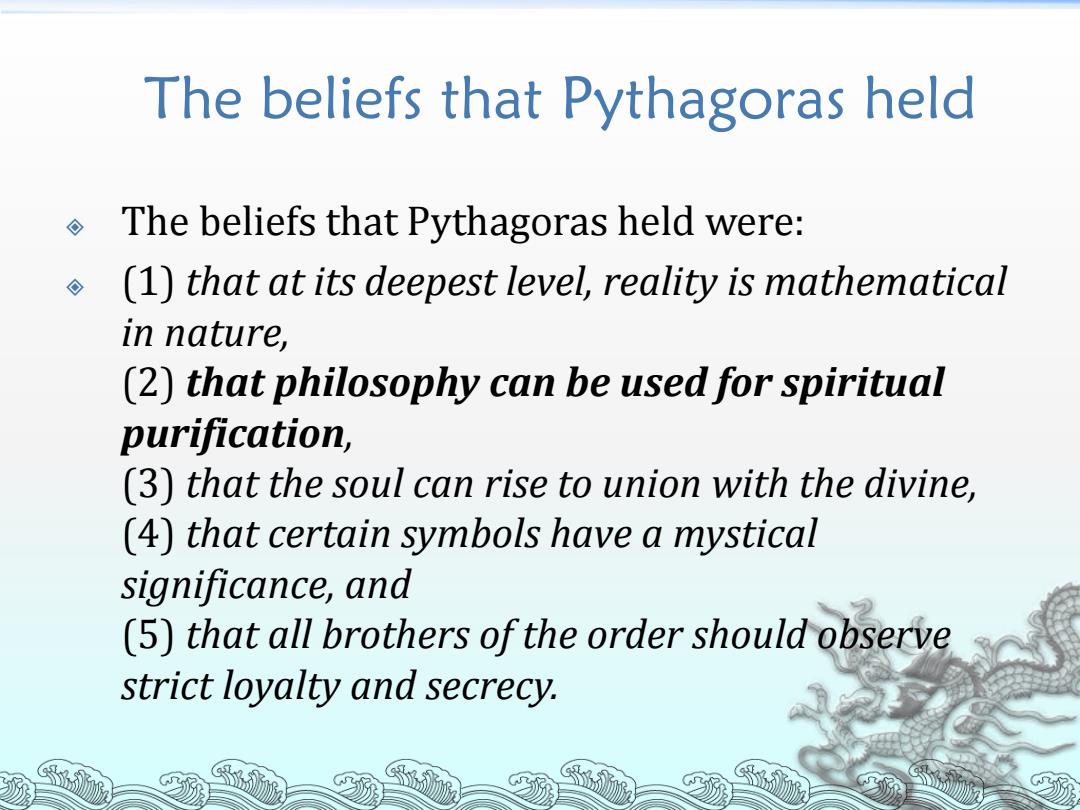
The beliefs that Pythagoras held The beliefs that Pythagoras held were: (1)that at its deepest level,reality is mathematical in nature, (2)that philosophy can be used for spiritual purification, (3)that the soul can rise to union with the divine, (4)that certain symbols have a mystical significance,and (5)that all brothers of the order should observe strict loyalty and secrecy
The beliefs that Pythagoras held The beliefs that Pythagoras held were: (1) that at its deepest level, reality is mathematical in nature, (2) that philosophy can be used for spiritual purification, (3) that the soul can rise to union with the divine, (4) that certain symbols have a mystical significance, and (5) that all brothers of the order should observe strict loyalty and secrecy
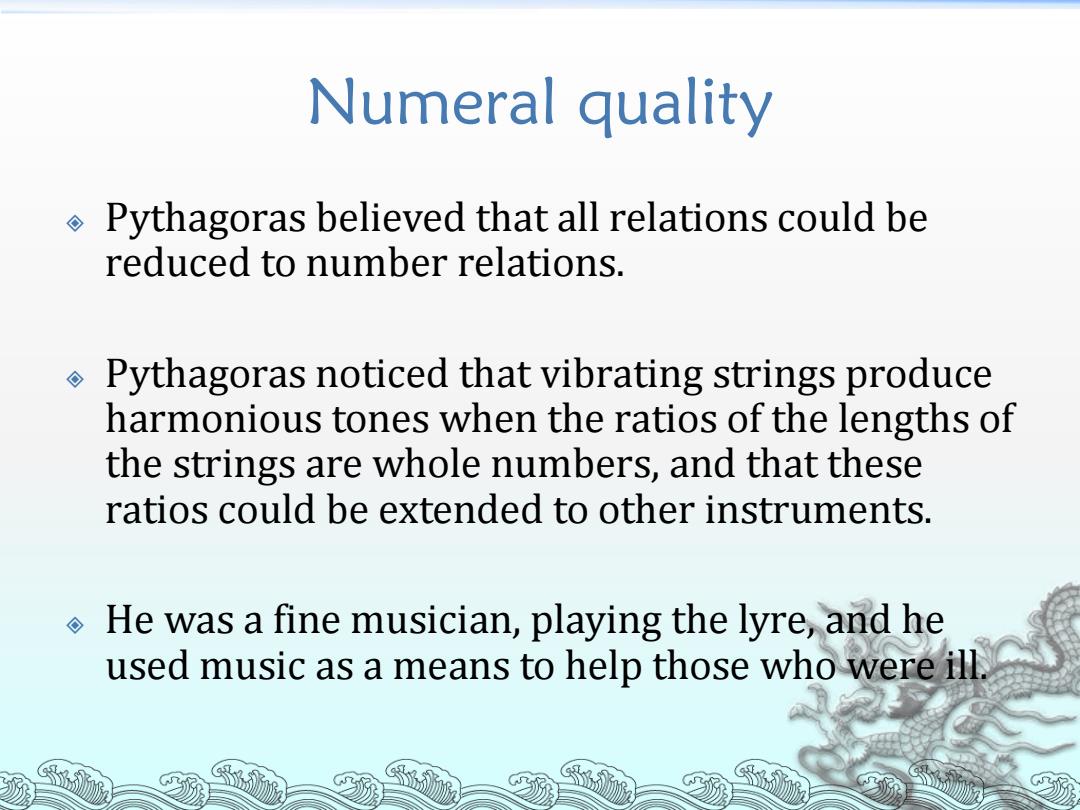
Numeral quality Pythagoras believed that all relations could be reduced to number relations. Pythagoras noticed that vibrating strings produce harmonious tones when the ratios of the lengths of the strings are whole numbers,and that these ratios could be extended to other instruments. He was a fine musician,playing the lyre,and he used music as a means to help those who were ill
Numeral quality Pythagoras believed that all relations could be reduced to number relations. Pythagoras noticed that vibrating strings produce harmonious tones when the ratios of the lengths of the strings are whole numbers, and that these ratios could be extended to other instruments. He was a fine musician, playing the lyre, and he used music as a means to help those who were ill